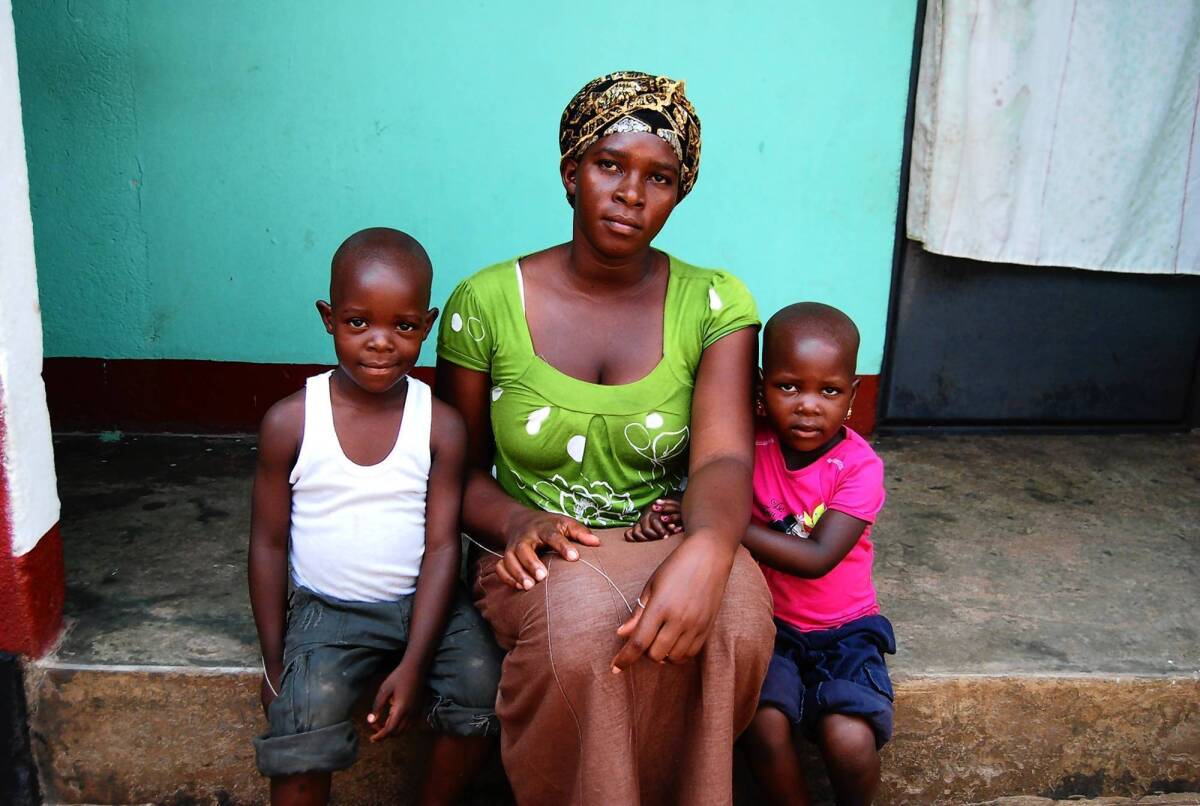Uganda widow wins compensation after fight

KASANA, Uganda â When Joyce Birabwaâs husband was killed in a suicide bomb attack in Mogadishu, 1,000 miles away, her whole world fell apart.
Left to raise two children alone, Birabwa barely had time to grieve before discovering her in-laws had plans that would leave her penniless.
First, they grabbed the land and cows her husband, Eriya Kabuye, kept in a rural village outside the central Ugandan town where the couple rented a house.
And then there was the compensation for the 2010 death of Kabuye, 27, a Ugandan soldier who served in an international peacekeeping force in Somalia. Her brother-in-law claimed the entire $50,000 payment and she learned about it only when a relative heard him boasting about the money in a local bar.
In Uganda, a conservative, God-fearing society, women have few financial protections or rights. A 1904 inheritance law provides only 15% of a manâs estate to his widow if he leaves no will; it hasnât been amended in more than 40 years. The law also gives a manâs home and land to his sons or brothers.
So when her brother-in-law seized all her husbandâs land and 12 cows, âthere was nothing I could do,â Birabwa said. But after a grueling two-year struggle, Birabwa eventually did manage to receive $24,000 in compensation from AMISOM, the African Union force fighting Al Qaeda-linked rebels in Somalia.
âWe haggled over it for a very long time. I just wanted to end it. I was fed up,â she said, explaining why she accepted less than half of the $50,000.
Birabwaâs mother, Jane Nakiganda, 48, incandescent with rage when she heard that her daughterâs in-laws were planning to grab the compensation, was responsible for getting the initial tip and urging her daughter to react.
âI said, âWe are not going to take this lying down.â I said, âDonât just sit there. Get out and get whatâs your right.â
âIâm old enough to have seen things like this happen all my life,â Nakiganda, 48, added. âWhen a woman loses her husband, sheâs the one who suffers.â
Uganda, like many other African nations, remains a largely male-dominated society, in which a widow is âleft at the mercy of her husbandâs line and his heir,â according to a 2010 study by academics Florence Asiimwe of Ugandaâs Makerere University and Owen Crankshaw of the University of Cape Town in South Africa.
A U.S. State Department human rights report on Uganda for 2011 says nearly half the nationâs widows are dispossessed of all or some of the family property after their husbands die.
The dominance of conservative religious groups, including the Catholic Church, Ugandaâs largest, has helped suffocate efforts at reform. Ugandan President Yoweri Museveni, a conservative traditionalist who has been in power since 1986, also has quashed efforts to pass laws protecting women.
Last month, he dashed the hopes of activists with an attack on a proposed bill that would grant women equal rights in marriage and divorce. The legislation, recently debated in parliament, has failed to pass since the 1960s.
In a statement to party lawmakers, Museveni supported traditional inheritance and divorce laws.
âI do not like women who pollute our women emancipation movement by introducing elements of mercenerism [sic] in marriages,â he said, referring to the provisions that would allow women to claim a share of marital property after divorce. Cooking and cleaning shouldnât entitle them to marital property after divorce, he said.
âThe greatest point in all this is not to antagonize our pre-capitalist traditional societies with the ultramodern liberal ideas of the elite,â Museveni said.
The bill would also prohibit the compulsory payment of goats and cows in exchange for a bride; prevent forced marriages; ban âwidow inheritance,â in which a woman can be forced to marry her brother-in-law; and outlaw marital rape. Museveni argued that Uganda was not ready for many of the proposed changes.
âTo go into marital rape will involve us [in] litigations for which we have no witnesses,â he said.
Rita Aciro of the Uganda Womenâs Network said women have been struggling since the 1950s for laws providing equality in marriage, divorce and inheritance.
âIn Africa, and Uganda in particular, people want to use religion and culture and male dominance to undermine the rights of women, particularly in the home sphere and the domestic sphere,â Aciro said.
She said many Ugandan women in traditional rural settings are unaware of the rights they do have. âBecause of our socialization, many women still believe that theyâre lesser beings than men in terms of power relations.â
With two children, ages 3 and 5, Joyce Birabwa has already spent all but $4,200 of her share of the compensation, buying land and building four houses, which are nearly complete. She plans to live in one and rent out the others, bringing in about $190 a month, enough to support her family. Next, she says, she hopes to open a beauty salon.
âIâm sure the project will help the children. They wonât go without meals,â she said.
Thatâs better than many Ugandan widows have it, she said.
âIt would have been worse if I hadnât received a single penny. At least I got something.â
More to Read
Sign up for Essential California
The most important California stories and recommendations in your inbox every morning.
You may occasionally receive promotional content from the Los Angeles Times.










